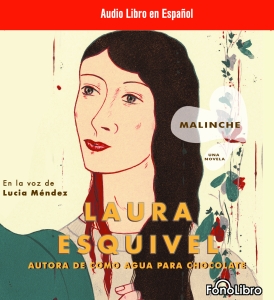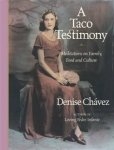Posted by Elena del Valle on April 6, 2007
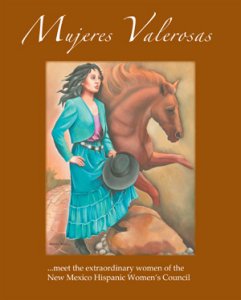
Mujeres Valerosas book cover
Photo: Hispanic Women’s Council
Mujeres Valerosas, a 142-page documentary book published by the Hispanic Women’s Council, showcases the accomplishments of 79 contemporary Latina women leaders in New Mexico. All of the women in the book were nominated by their peers. Except for the book committee who selected the final nominations for publication, there were no judges.
The book was partially funded by major grants from the Center for Regional Studies, University of New Mexico and the New Mexico Women’s Foundation. The book, which includes 83 black and white photographs and a soft cover color illustration by Simone Debbas, costs $25.
Through essays, photos and short biographies, the women share life lessons and practical approaches to personal and professional success in Mujeres Valerosas. The idea behind the book was to highlight the many accomplishments and successes of the women who “improve the quality of life of others” by serving their community, growing a business or working to institute public policies. Their creativity and tenacity in overcoming obstacles and their ability to summon the strength and courage to move beyond setbacks are described as inspirational to readers.
The Hispanic Women’s Council is a non-profit organization founded in 1988 to promote, support and create opportunities for Hispanic women. The organization is based in Albuquerque, New Mexico.
Hear from market researchers about the Latino family in
“Latino Family Dynamics” audio recording


Brenda Hurley and Liria Barbosa
Click here to purchase a downloadable or CD audio recording with extended information on Latino Family Dynamics by Brenda Hurley and Liria Barbosa
Comments:
Filed Under: Books
Posted by Elena del Valle on March 30, 2007

Opening the Borders book cover
Photo: Level 4 Press
About the only agreement in the vitriolic illegal immigration debate is that it’s one of America’s thorniest hot-button issues and will play a pivotal role in the 2008 presidential election. Politicians are tap-dancing around the topic and offering few practical solutions. Is there a logical and humane answer that benefits the United States and Mexico? Journalist Larry Blasko dives head-first into this raging controversy with a new 211-page hardcover book, Opening the Borders: Solving the Mexico/U.S. Immigration Problem For Our Sake and Mexico’s (Level 4 Press, $24.95).
Research indicates there are between 10 and 12 million illegal Mexican immigrants in the United States. That enrages some Americans who feel their tax dollars are supporting illegal immigrants. Other Americans champion anyone’s right to find jobs and build better lives for their families.
“You have one side shouting ‘Deport Them!’ and the other side shouting ‘Love Them!’” said Blasko. “But the reality is hand-wringing and finger-pointing solve nothing. A logical solution could be implemented by now with all the energy both sides have expended screaming for extreme measures.”
According to promotional materials, in Opening the Borders Blasko outlines the early, rocky relationship between the U.S. and Mexico. He then hones in on the immigration issue today, and reminds readers that America was founded by immigrants.
By illustrating the impact illegal Mexican immigrants have on the U.S. economy, Blasko makes a case for hammering out an agreement between U.S. and Mexican leaders that would benefit both nations. He points to a speech by New York City Mayor Michael Bloomberg detailing the crucial role immigrant workers play in that city’s economy.
Opening the Borders takes a close look at the argument that illegal immigrants are stealing jobs from law abiding Americans. “Let’s be realistic for just a minute,” said Blasko. “Sure, you can say that these low-paying jobs have been proliferated by illegal immigrants, but ask yourself, are there really millions of Americans lining up for these jobs?”
Blasko served for more than three decades with The Associated Press as writer, editor, columnist and executive. He is the author of two other books, ABCs of Computing, a Plain-English Guide, and Vamp!
Hispanic Marketing and Public Relations Understanding and Targeting America’s Largest Minority book
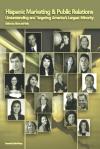
“A must resource for practitioners/professionals expecting to reach US Hispanics; also valuable for college programs in marketing, public relations and communications. Highly recommended.”
Choice magazine
Click here for more information and to buy your copy today!
Comments:
Filed Under: Books
Posted by Elena del Valle on March 16, 2007
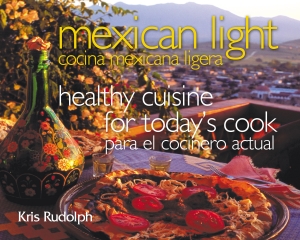
Mexican Light:Healthy Cuisine for Today’s Cook book cover
Photo: University of North Texas Press
A recently released cookbook, Mexican Light: Healthy Cuisine for Today’s Cook, focuses on preColumbian low in fat and high in fiber and vitamins diets of Mexico. The paperback book by Kris Rudolph was published by University of North Texas Press late last year and retails for $17.95. The recipes and text are included in Spanish on facing pages.
Rudolph is a native of Houston and owner of the restaurant El Buen Café in San Miguel de Allende, Mexico, where she lives. She also offers culinary tours and teaches Mexican cooking classes, as well as a dancing and cooking workshop called “Salsa and Salsa.”
According to promotional materials, before the arrival of Columbus the people of Mexico ate corn, squash, tomatoes, beans, and lean meats and had a diet close to the recommendations for healthy eating of today.
The book opens with a short introduction outlining the history of Mexican cooking, followed by an overview of healthy eating habits, a description of the most common ingredients, and a guide to planning for parties. Fifty recipes cover a number of topics such as appetizers and after-dinner refreshers including: Lime and Cilantro Soup, Shrimp Ceviche Salad, Chicken Poblano, Pork Loin with Mango-Chipolte Salsa, Mexican Beef Tips, and Fish Veracruz Style.
Each recipe also includes the number of calories, amounts of total fat and saturated fat, grams of carbohydrates, and amount of fiber. Rudolph suggests low-fat and low-carbohydrate alternatives, as well as ways to vary the spiciness.
“Latino Family Dynamics” audio recording


Brenda Hurley and Liria Barbosa
Click here to purchase a downloadable or CD audio recording with extended information on Latino Family Dynamics by Brenda Hurley and Liria Barbosa
Comments:
Filed Under: Books
Posted by Elena del Valle on March 9, 2007
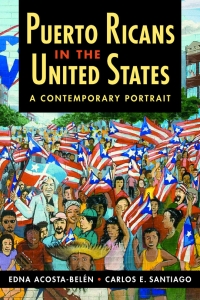
Puerto Ricans in the United States book cover
Photo: Lynne Rienner Publishers
Academics Edna Acosta Belén and Carlos E. Santiago focus on the trajectory and status of Puerto Ricans in the United States in the 272-page Puerto Ricans in the United States: A Contemporary Portraitbook (Lynne Rienner Publishers, $22.50). Choice magazine selected Puerto Ricans in the United States a 2006 Choice Outstanding Academic Title. Outstanding Academic Titles are chosen for their excellence in scholarship and presentation, the significance of their contribution to the field, and the important treatment of their subject.
The book is divided into eight chapters: Introduction: Portrait of a Commuter Nation; The Colonial Experience; Migrations Before World War II; Postwar Migration Patterns; A Demographic Portrait; Social and Civil Rights Struggles; Voices and Images of the Diaspora; and Overcoming the Colonial Experience: Future Challenges. It includes 28 graphics and 19 black and white illustrations. The cover designed is a reproduction from the mural “Sea of Flags” by Gamaliel Ramírez and Eren Star Padilla in Chicago.
Edna Acosta-Belén is Distinguished Professor of Latin American, Caribbean, and women’s studies at the University at Albany, SUNY, where she is also director of the Center for Latino, Latin American, and Caribbean Studies. She serves as coeditor of the Latino(a) Research Review, which she founded with Carlos Santiago. Carlos E. Santiago is chancellor of the University of Wisconsin-Milwaukee and professor in the university’s Department of Economics. He has published extensively on the Puerto Rican diaspora.
“Latino Identity and Situational Latinidad ” audio recording


Presenters Diana Rios and Ph.D., Federico Subervi, Ph.D.
Click here to purchase a downloadable or CD audio recording with presentations on Latino identity by Diana Rios, Ph.D. and Federico Subervi, Ph.D. and a bonus interview with the professors
Comments:
Filed Under: Books
Posted by Elena del Valle on January 26, 2007

El Zahir audio book cover
Photos: FonoLibro Inc.
FonoLibro, a Spanish language audio book company owned by Venevision International, recently announced it will make its products available online via Audible. This will allow FonoLibro customers to download the audio books onto their computers, audio and MP3 players and enabled cell phones.
They can also burn the audio books onto CDs. The versatile format allows “readers” access to books they might not have time for in the traditional printed format. Audible is the exclusive provider of audio books of iTunes, making those products available for download into the popular iPod players.
FonoLibro sells classics titles by Alejandro Dumas El Conde de Monte Cristo, El hombre de la mascara de hierro, and La dama de las Camelias. More recent titles incluye El Código Da Vinci, winner of the 2006 Audies Award as Best Spanish language audio book; and Ángeles y Demonios by Dan Brown.
Malinche audio book cover
Other titles include El Zahir by Pablo Coelho and John Grisham best sellers El Intermediario and El Rey de Los Pleitos. The company also offers a broad selection of self help titles. This month it will release Malinche by Laura Esquivel recorded by Lucia Méndez.
FonoLibro audio books are available at bookstores and on the company website FonoLibro.com. FonoLibro produces and distributes audio books and audio entertainment for Venevision International.
Hispanic Marketing and Public Relations Understanding and Targeting America’s Largest Minority book

Click here for more information and to buy your copy today!
Posted by Elena del Valle on November 13, 2006

Tracy Vega, director, Marketing & Publicity, Rio Nuevo Publishers
Photo: Tracy Vega
A podcast interview with Tracy Vega, director, Marketing & Publicity, Rio Nuevo Publishers is available in the Podcast Section of Hispanic Marketing & Public Relations, HispanicMPR.com. During the podcast, she discusses book publishing and Latino markets with Elena del Valle, host of the HispanicMPR.com podcast.
As a native of Arizona, Tracy has spent a life immersed in the diversity of cultures in the American Southwest. She received a BA in English and in Creative Writing from the University of Arizona. While pursuing her degree, Tracy interned with the University of Arizona Press Marketing Department and got a taste of the publishing industry.
Prior to her career in the field of publishing, Tracy’s work experience included tending bar, waiting tables and Early Intervention for the Arizona Department of Developmental Disabilities. She feels each job has enriched her effectiveness to interact with individuals across the boundaries of ethnicity, socio-economics, and ability.
In 2003, Tracy accepted a position at Rio Nuevo Publishers. During her time as Director of Marketing and Publicity, she promoted many award winning books such as Birds of Prey in the American West, winner of the Mountains & Plains Booksellers Association Best Art Book (2004); Voice of the Borderlands winner of the Western Spur Award in Poetry (2006) and most recently, Yard Full of Sun: The Story of a Gardener’s Obsession That Got a Little Out of Hand winner of the American Horticultural Society Book of the Year Award (2006).
She is currently working on Rio Nuevo Publisher’s most recent release A Taco Testimony: Meditations on Family, Food and Culture by award-winning author Denise Chávez, and the upcoming title, The Reaper’s Line: Life and Death on the Mexican Border, scheduled for publication September 2006. Tracy lives with her son in Tucson, Arizona.
To listen to the interview, scroll down until you see the “Podcast” on the right hand side, then select “HMPR Tracy Vega” hit the play button or download it to your iPod or MP3 player to listen on the go, in your car or at home. To download it, click on the arrow of the recording you wish to copy and save to disk. The podcast will remain listed in the November 2006 section of the podcast.
A Taco Testimony by Denise Chavez (Rio Nuevo, $16.95)
Click here to buy A Taco Testimony: Meditations on Family, Food and Culture
Click the button to hear the podcast:
Click here to sponsor a HispanicMPR.com podcast
Posted by Elena del Valle on August 11, 2006
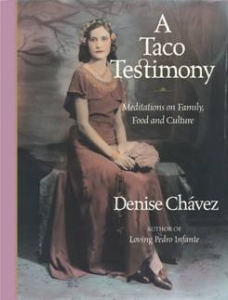
A Taco Testimony cover
Photo: Rio Nuevo Publishers
Denise Chavez who defines her roots as being from New Mexico, Texas, and México is the author of the newly released A Taco Testimony Meditation on Family, Food and Culture (Rio Nuevo Publishers). The 207-softcover book on “ruminations on a life lived among tacos” is set in the U.S.-Mexico border and written as a memoir to the author’s parents and family. Although it includes some recipes it is not a cookbook. The cover price is $16.95.
A Taco Testimony is peppered with words in Spanish and recepies. Although it has menu like section titles it is about Chavez’ memories of growing up in a Mexican American home more than it is about Mexican food.
An award-winning fiction writer, playwright, actress, and teacher, Chávez considers herself a “performance writer.” In 1995 her first novel, Face of an Angel, won the American Book Award. She authored the novel Loving Pedro Infante, as well as nonfiction, fiction for children, and more than 45 plays.
According to her biography, her writing and many community projects have been supported by the Fulbright Commission, the Lannan Foundation, and a Lila Wallace-Reader’s Digest Award. Chávez founded the Cultural Center of Mesilla and the Border Book Festival, of which she is executive director. She lives with her husband in Las Cruces, New Mexico.
Click here to buy A Taco Testimony: Meditations on Family, Food and Culture
Posted by Elena del Valle on March 23, 2006

Selling to Latinos by Andrew Erlich, Ph.D.
A new book, Selling to Latinos: The Bridge to Understanding (Multi-cultural Publications, $39.95) was recently published. It was authored by Andrew Erlich, Ph.D., cross-cultural psychologist, multi-ethnic market research pioneer and the founder of Erlich Transcultural Consultants (ETC). The 192-page hardbound book was published by a division of ETC and is available for purchase on the company website.
The author’s goal is to provide sales professionals with in-depth cultural understanding and ethnic awareness to facilitate their efforts in the rapidly growing U.S. Latino markets. Dr. Erlich explains to readers how to differentiate generations of Hispanics by their connection to their culture as well as how and why Hispanic culture has shaped the prospect’s approach to a sales transaction. Stressing that sales staff don’t need to speak Spanish to understand the culture, the author shares examples of how to make the customer comfortable in various sales settings.
A member of the advisory board for Urban Call, a trade magazine for retailers, Dr. Erlich has appeared on local, national and international Spanish-language radio and television shows. He has more than 20 years of experience in transcultural marketing research, consultation, organizational development and cultural competency training. As president of ETC he oversees the firm’s business, moderates Spanish-language and general market focus groups, and leads cultural competency training sessions.
Dr. Erlich is an active member of the National Speakers Association, The Speakers Academy and the Arizona Speakers Association. He has written articles for Marketing News, Quirk’s Market Research Review, the Journal of Marketing and International Business magazine. Raised in El Paso, Texas, he is English-Spanish bilingual. Dr. Erlich, a cum laude History graduate of the University of Texas, received an M.A. and a Ph.D. in Clinical Psychology from the California School of Professional Psychology.
Comments:
Filed Under: Books
Posted by Elena del Valle on March 21, 2006

VW campaign “Gone tamale” ad
Auburn Hills, Michigan – VW (Volkswagen) is using Latino cartoon icon Speedy Gonzales™ to promote the GTI Mk V to Hispanic audiences. The campaign, created by CreativeOndemanD (C.O.D), Volkswagen of America’s Hispanic advertising agency of record, blends animation with real footage.
Just barely beyond the start line and the campaign has sparked controversy among Latinos. Popular political Hispanic blog Latinopundit.com mentioned the campaign March 18 in relation to the reaction of some Latinos to a Spanish language word used in one of the ads and its vulgar meaning in Spanish.

VW “Gracias” ad
Two Volkswagen engineers take the new GTI Mk V for a test run. Speedy Gonzales™ goes out for a cheese run. Somewhere in the middle of the desert the two icons of speed coincide. So goes the spot titled “Speedbump,” part 1 of an episodic three-part TV campaign for the Hispanic market launch of the new Volkswagen GTI Mk V launched recently.
“The Speedy Gonzales and new GTI Mk V match-up is a natural,” said Kerri Martin, director of brand innovation for Volkswagen of America, Inc. “Both have permeated pop culture. Both have a loyal and passionate fan base. Both have achieved iconic status in a world of high-powered acceleration. Speedy Gonzales will help take the new 2006 GTI’s message to a group of Hispanic drivers who may have not yet experienced the speed and responsiveness of our German engineered hot hatch.”
The GTI Mk V, dubbed by VW as the “original pocket rocket,” has a high-tech, 200 hp 2.0T 4-cylinder engine that produces 207 ft.-lbs of torque from 1,800 to 5,000 rpm, a new fully independent, sports tuned suspension and “an understated but dynamically aggressive style.”
“In the Hispanic market, Speedy Gonzales is our superhero,” commented C.O.D’s founding partner and creative director, Priscilla Cortizas. “Not only is he the epitome of speed, he communicates positive values like altruism, resourcefulness, intelligence and confidence.”

VW “Turbo-Cojones” ad
According to VW’s promotional materials, famous Speedy Gonzales, touted as “the fastest mouse in all Mexico,” sports enviable credentials like the ability to accelerate at great speeds; a quick-thinking mind and unselfish heart; and the ability to outrun and outwit his foes. In “Cats,” the second spot in the campaign, Speedy Gonzales taunts alley cats from the back of the new 2006 Volkswagen GTI. Later, the spot entitled “Replay” takes the audience back to Speedy’s hungry mouse friends who clamor for some cheese. Thanks to Speedy’s quick thinking, the convenient location of a cheese factory across town, and the campaign’s turbo-charged 2006 GTI Mk V’s, the problem is solved to the sounds of “Andale, andale, arriba, arriba.”
To create the spots C.O.D worked closely with Warner Bros. Consumer Products and Warner Bros. Animation. The spot entitled “Replay” fuses vintage Speedy Gonzales cartoons with state-of-the-art computer animation created by Radium. Founded in 1955, Volkswagen of America, Inc. is headquartered in Auburn Hills, Michigan, and is a wholly owned subsidiary of Volkswagen AG, one of the world’s largest automakers.
Comments:
Filed Under: Books
Posted by Elena del Valle on January 17, 2006
Purchase Hispanic Marketing Grows Up:
Exploring Perceptions and Facing Realities
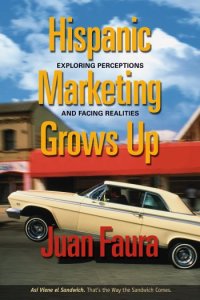

Juan Faura, author of The Whole Enchilada: Hispanic Marketing 101 (Paramount Market Publishing, Inc. $25.95)), wrote a new book entitled Hispanic Marketing Grows Up Exploring Perceptions and Facing Realities Asi Viene el Sandwich (Spanish for That’s the Way the Sandwich Comes) due to be released January 26, 2006.
According to the publisher, the book is based on “insights gathered from interviews with Hispanics from many different walks of life, in cities large and small.” In the book, Faura explores 30 perceptions and realities that affect how how to market to Hispanics; explains when to use Spanglish in advertising; and identifies 10 future trends he believes will affect the Hispanic consumer market.
Faura is president and C.E.O. of Cultura, a Dallas-based advertising and marketing company specializing in Hispanic markets which he founded in 1999. In the past he worked as a researcher and consultant specializing in marketing to U.S. Hispanics. His Mexican and Puerto Rican heritage, his experience living in Mexico City, his track record working in various jobs with Hispanics since graduating from a U.S. high school he feels, provide him special insight.
Ever since Hispanic Marketing became a buzz term, consultants and professionals have been preaching a similar sentiment: treat Hispanics as a unique sect of people, and focus on their “Hispanicness” before everything else in order to connect with them and get into those ever-growing pocketbooks. Faura, a multicultural advertising specialist and book author, claims this approach is all wrong. In this book Faura proprosed a new method of marketing to Hispanics some believe is sure to get a rise out of traditionalists.
Coming off of his recent success in his book The Whole Enchilada: Hispanic Marketing 101, in his new book, Faura challenges Hispanic marketing and advertising agencies to “grow up” and use their skills to appeal to the human side of the consumer, rather than focusing simply on their Hispanic demographic. Faura insists that looking at Hispanic consumers as Hispanics first is counterproductive to connecting with them as human beings.

Juan Faura, author Hispanic Marketing Grows Up
“My philosophy is that we need to appeal to the human side of the target consumer before we dissect their ethnicity,” said Faura. “We all make decisions as people, not as categories, thus we should hone in on connecting with consumers as people with fundamental needs and desires.”
Tackling subjects from media use to acculturation, Faura shares insights into Hispanic culture that he gained after an intense period of face-to-face encounters with Hispanics in more than 18 states and 74 cities. A veteran of the industry with 15 years experience in marketing research, Faura started this process knowing well how many perceive Hispanic consumers; his mission was to determine if these perceptions were true by getting answers straight from the source.
The book delves into stereotypes and their basis in reality; taboo issues such as sexual orientation, family structure, socioeconomic stereotypes and gaps in healthcare and technology; and the preference for English-language media.
“I am sure that this book will have a lot of fans, and a lot of adversaries,” said Faura. “The Hispanic marketing and advertising industry is not ready to be exposed to some of these truths, but in order to advance, we must continue to delve and learn. Marketers will need to be willing to rethink and modify their Hispanic strategies if their mission is success. ”
Faura’s books and articles are based on insights gained over his career through conversations with more than 70, 000 Hispanics across the U.S. and a range of ages, genders, cultural, language and socioeconomic backgrounds. Prior to founding his company he worked as director of Global Strategy for Cheskin Research and director of Research for Market Development, Inc. Faura served as a consultant on Hispanic marketing for Fortune 100 companies such as Hershey, Pizza Hut, Ortho McNeil, Ford, Neutorgena, Zubi Advertising, J&J, Hormel, Pepsi, Visa, Wells Fargo, Frito-Lay, Labbatt’s (Tecate) and Mercedes Benz. He has also worked at a bakery, been a pipe fitter, a mechanic and a paint and body man.
Faura holds a Doctorate of Juris Prudence from Thomas Jefferson School of Law and a certificate in welding and sheet-metal handling from the Urban League in San Diego. He lives in Southlake, Texas with his wife Sara his children Juan, Amanda, and Sebastian and his three boxer dogs Bongo, Memphis, and Lola.
Comments:
Filed Under: Books










